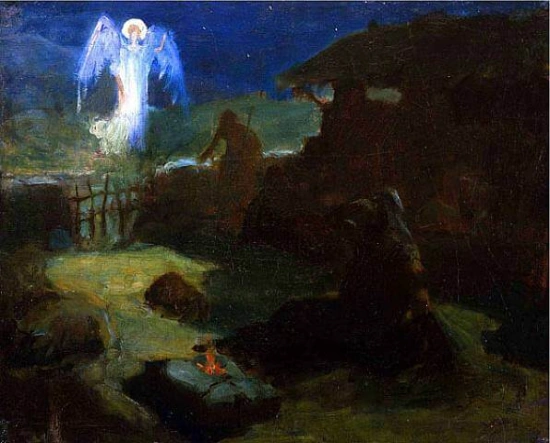1211. And ye that fear him.- That this signifies the worship of the Lord by those who are in the good of love, is evident from the signification of the fear of God, as denoting worship from the good of love, concerning which see above (n. 696, 942, 1150).
[2] Continuation [concerning the Vegetable Kingdom].- We shall now make a few observations respecting plants in heaven, animals there having been treated of above. There are in the heavens, as on earth, plants of every kind and species. There are there even those which are not found on the earth; for there are composite forms of genera and species, also with infinite variation. This property they derive from their origin, of which we shall speak below. The genera and species of plants again differ in the heavens, like the genera and species of the animals there, of which we have treated above.
[3] There appear there, according to the degrees of light and heat, paradisiacal gardens, groves, fields, and plains, and in them shrubberies, lawns, and beds of flowers. In the inmost or third heaven especially, there are groves of trees, the fruits of which distil with oils; there are beds of flowers, from which fragrant odours are diffused around, and in the seeds of which there are delicious flavours arising from their fragrance, and the oil which they contain; grass-plots too which abound with similar perfumes. In the middle or second heaven there are also groves of trees, the fruits of which distil with wines; and beds of flowers from which exhale delightful odours, and the seeds of which possess a variety of delicate flavours; there are grass-plots also of a similar kind.
[4] In the lowest or first heaven there are objects similar to those in the inmost and middle heavens, but with a difference in the delights and charms which they possess, according to their degrees. There are also in the inmost heavens fruits and seeds of pure gold; in the middle heaven the same objects are of silver; and in the lowest, of copper; there are also flowers formed of precious stones and crystals. All these are productions springing forth from the earth there. For there are earths there as with us, but nothing is produced there from seed that is sown, but from seed created, and creation there is instantaneous, the duration being sometimes long and sometimes momentary; for they exist by the forces of light and heat from the Sun of heaven, which is the Lord, without the aid of the light and heat of the sun of the world. The materials of our earths are fixed, and the germinations constant; but the matters or substances in the lands (in terris), which are in the heavens are not fixed, therefore the germinations from them are not constant. Everything there is spiritual under a natural appearance; but it is different in the lands subject to the sun of our world.
These things are adduced in order that the fact may be confirmed that in every thing spiritual, whether in heaven or in the world, there are those three forces, namely, the active force, the creative force, and the formative force, and that these forces continually tend to their ultimate, wherein they terminate and subsist; and this not only in primaries, but also in ultimates. For this reason lands also exist in the heavens, the lands there being those forces in ultimates. The difference is, that lands there are spiritual from their origin, while here they are natural, and that the productions from our lands are effected from the spiritual through the medium of nature, but in those lands without the medium of nature.







